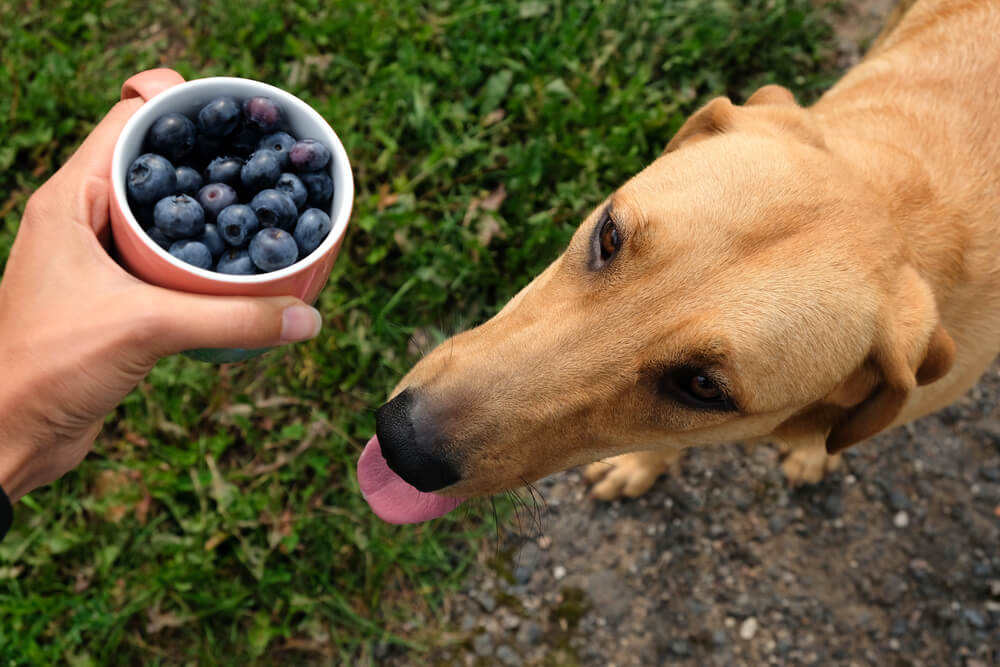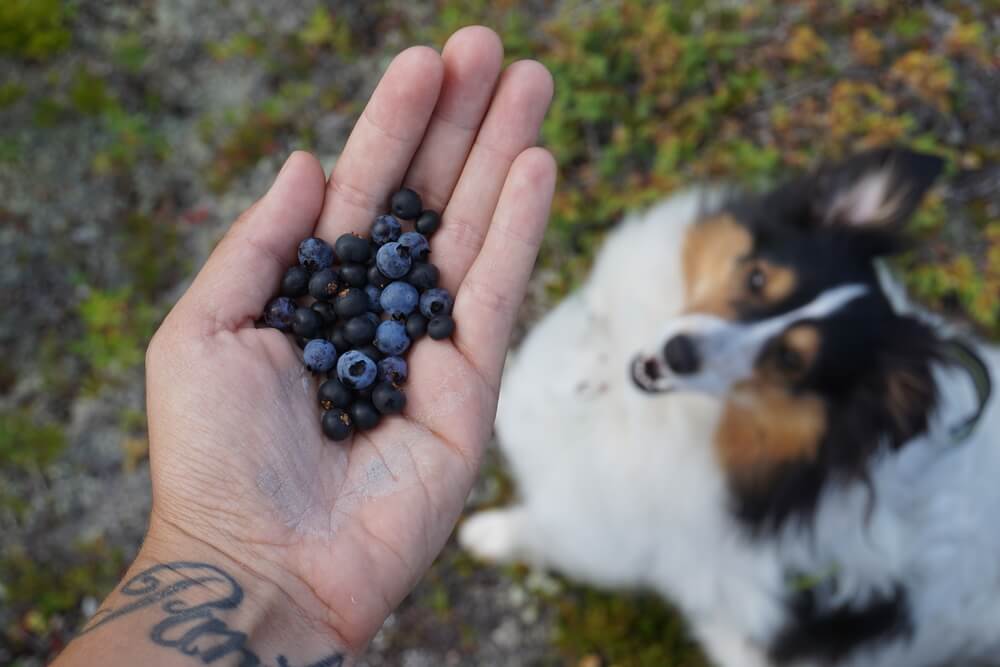
We all love to share food with our dogs sometimes, after all, who can resist those big pleading eyes? Many fruits (such as cranberries) and vegetables (carrots, pumpkin…) provide some of the same health benefits to our dogs as they do to us humans, but as with any new food, you should always check that it’s safe for dogs to eat before feeding it to your four-legged friend. Some seemingly harmless foods such as grapes can be extremely toxic to dogs, even if only one or two are eaten. So, what about blueberries? Are they safe for dogs to eat? Let’s take a closer look at whether this human superfood is safe for dogs.
What are blueberries?
Blueberries are a small round fruit with dark blue skin. They are often referred to as a ‘superfood’ when it comes to humans, primarily because of their high antioxidant content and the fact that they’re full of vitamins and minerals. Blueberry plants fruit in summer but tend to be available year-round from grocery stores which often import them from warmer countries.
Are blueberries bad for dogs?

Watch out for how many blueberries you give your dog because of their high fiber content.
On the whole, blueberries are perfectly safe for dogs to eat. That said, moderation is key, and feeding too many blueberries to your dog is likely to give them an upset stomach which could result in diarrhea and/or vomiting. This is because of their high fiber content. Bear in mind that blueberries might be healthy but they still contain a lot of natural sugar so too many can be bad for your dog’s teeth.
Are blueberries good for dogs?
Not only are blueberries safe for dogs to eat, but they also can provide many of the same health benefits to dogs as they do to humans! Blueberries are rich in antioxidants which help to prevent damage to cells throughout the body. They’re packed with fiber and other vitamins and minerals such as Vitamin C and Vitamin K. Both of these vitamins are vital for a healthy immune system as well as contribute to overall good health.
Blueberries are low in calories so are ideal as small treats for dogs that either need to lose weight or are watching their waistline! They contain 85% water so make for a refreshing and hydrating snack for your pooch on a hot summer day. They are also high in fiber which is essential for healthy digestion.

Blueberries are low in calories so are ideal as small treats for dogs that either need to lose weight or are watching their waistline!
How to safely feed blueberries to your dog
As a general rule, no more than 10% of your dog’s diet should be treats, so you should check with your veterinarian what the appropriate portion size is for your dog. As with any new food, begin by offering a single blueberry to your dog to check that he likes it and that there are no adverse reactions. Although unlikely, there is a tiny chance that your dog could be allergic to blueberries. Signs of an allergy include drooling, swelling of the eyes, nose, and face, hives (small bumps) over the body, or excessive scratching. Some allergic reactions can be life-threatening so contact your veterinarian immediately if you suspect your pet is having an allergic reaction.
Serving suggestions for blueberries:
- You can feed them as singular treats during training sessions
- You could try mashing them or pureeing them
- You could sprinkle a few onto your dog’s food
Can puppies have blueberries?
Yes, puppies can eat blueberries but moderation is even more important for puppies because they often have more sensitive stomachs than adult dogs so feeding too many could result in vomiting or diarrhea.
Can dogs eat other blueberry products?

Steer clear of any blueberry-flavored products and stick to feeding fresh blueberries.
It is usually best to steer clear of any blueberry-flavored products and stick to feeding fresh blueberries. This is because some products might have harmful additives or artificial flavorings that could be bad for your dog. Let’s take a closer look at some blueberry products and find out whether they are safe for dogs.
Blueberry juice
A small lick of pure blueberry juice probably won’t harm your dog but bear in mind that a large quantity is likely to upset your dog’s stomach and will have a high sugar content which is bad for your dog’s teeth. Some fruit juices have artificial colorings or flavorings added to them which could be harmful to your pet.
Blueberry jam
Blueberry jam is bad for dogs as it has an extremely high sugar content and this can lead to tooth decay, obesity, and even diabetes. You should never feed your dog blueberry jam.
Blueberry yogurt
Many dogs have an intolerance to dairy which means that yogurt isn’t the best food for them. Some flavored yogurts can contain artificial sweeteners such as xylitol which is extremely toxic to dogs. It is best to avoid feeding your dog blueberry yogurt.
Blueberry Pop-tarts
Most of the ingredients in pop tarts are unhealthy for dogs to eat. Pop-tarts are not designed for dogs and they cannot process the ingredients in them properly. Some blueberry Pop-tarts contain xylitol, which is extremely toxic to dogs and can sometimes be life-threatening, even if they only eat a small amount. Never feed your dog any kind of pop tart, including blueberry ones.
So, can dogs eat blueberries?
The answer is yes, blueberries are safe for dogs to eat and can even provide several health benefits. Only ever feed them in moderation though and check with your veterinarian before introducing anything new to your dog’s diet. Bear in mind that just like people, different dogs have different taste preferences and some dogs may dislike blueberries. They might prefer a different fruit such as strawberry or banana but always check if the fruit is safe for dogs before feeding it to them.
FAQs
Are blueberries poisonous to dogs?
No, blueberries are not poisonous to dogs. Some dogs may dislike them though and feeding too many is likely to cause a stomach upset due to their high fiber content.
How many blueberries can I give my dog?
This depends on your dog’s size and tolerance for blueberries! The best thing to do is check with your veterinarian what the appropriate portion size is for your dog. Approximately 5-10 blueberries in a day, depending on your dog’s size, is probably a good rule of thumb.
What fruits can dogs not have?
Grapes and raisins are extremely toxic to dogs and could cause life-threatening kidney damage, even if a single fruit is consumed. Citrus fruits should be avoided as they are usually disliked by dogs and can cause digestive upset. Always check with your veterinarian that a fruit is safe for dogs before feeding it to your pet.
What do blueberries do for dogs?
Blueberries are packed with antioxidants which help to prevent damage to cells throughout the body. They also contain several vitamins and minerals which are essential for overall health. Blueberries have a high fiber content which is good for digestive health but does mean that too many blueberries are likely to cause a stomach upset!



